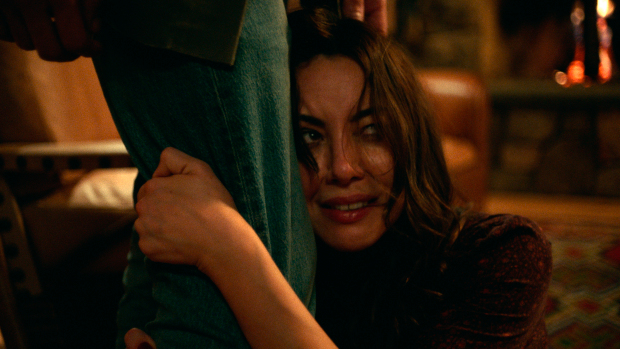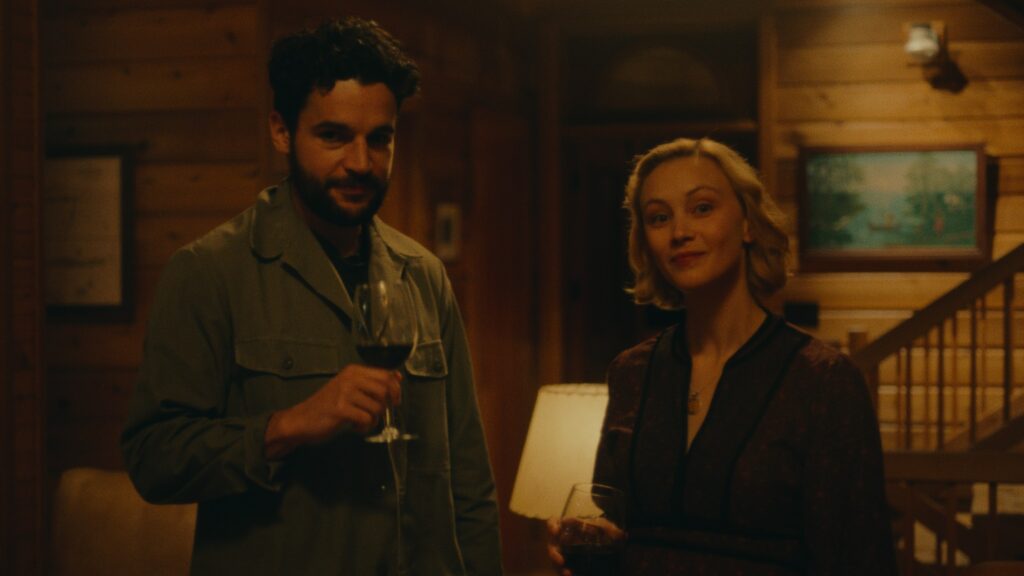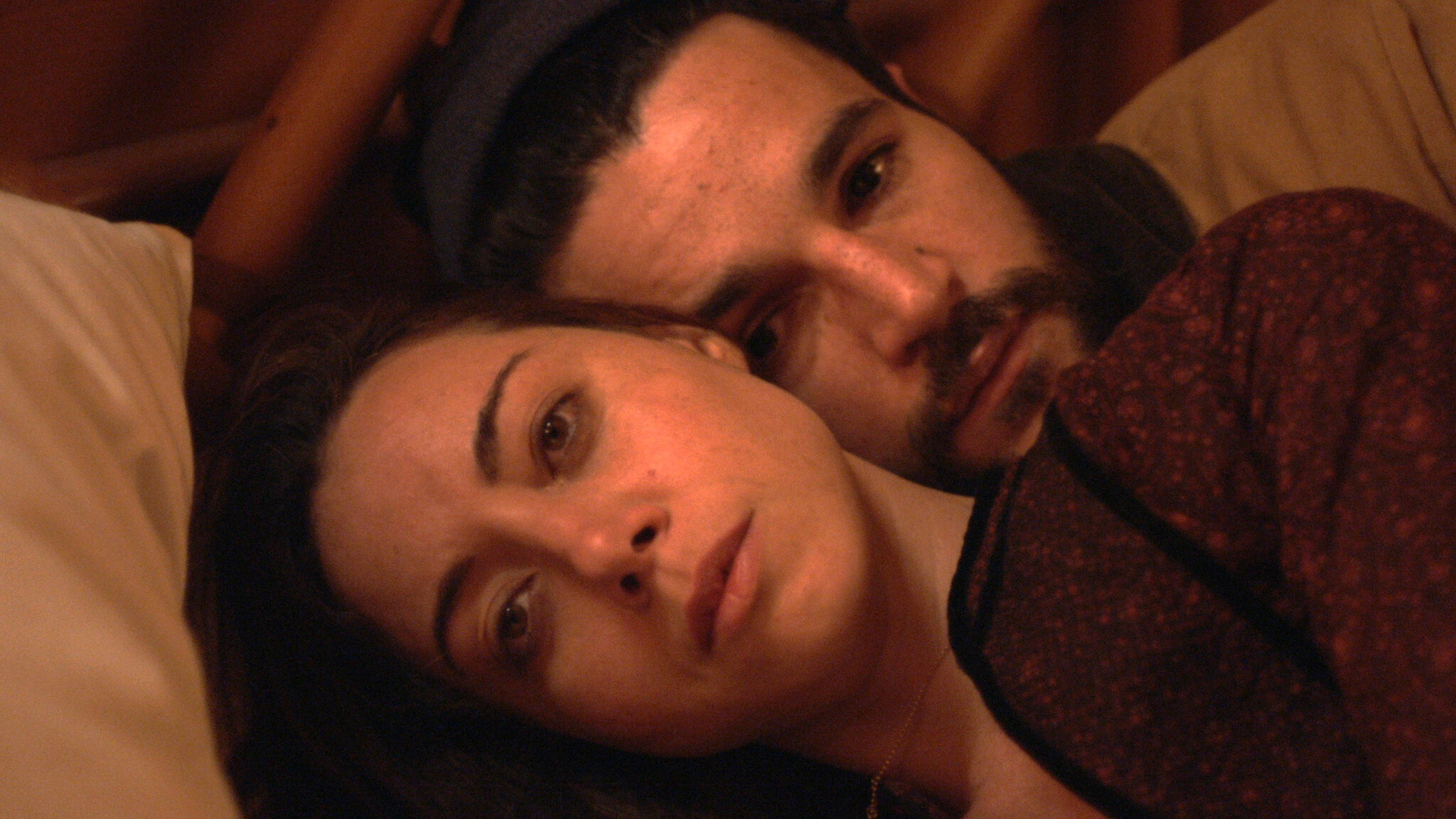What the hell was that Black Bear Ending. Occasionally, a movie will come along that will break 99% of all comers. We’ll innocently walk into it thinking that we are going to get a cool artsy, Indie, flick that will be about infidelity, or about modern troubles, and instead it walks in with a baseball bat and just lays waste to the audience with no intention of explaining itself. That is the movie Black Bear. Then they all run to the Google, typing, as fast as they can, “What the hell was that Black Bear Ending?”
It’s a movie so ripe with meaning and portent as to be a 2×4 to the face. But what is the meaning though? What is said portent? Exactly, let’s find out together shall we?
Look, I know you guys are smart. And you guys know that I don’t point you in the wrong direction when it comes to movies. But 1) do not watch that trailer if you trust me at all. The movie is about an artsy retreat cabin wherein a woman goes in order to write a movie? Or to maybe just recover. But it all goes sideways. And in the best, metaphysical, meta sort of way. 2) Do not go any further, and read anymore, as you will ruin the best surprise ever. This is a little movie with an astounding message, and surprise. Don’t unwrap it before you watch!!
What the hell was that Black Bear Ending
Alright – let’s see… how should we go about talking about this film? Chronologically? Or back to front, and inside out? Hrmmm. I think we’ll just give it a standard chronological walk through, and then double back on it again after we finish. Because you have watched this film…and you aren’t interloping, that comment makes sense to you. RIGHT? Right. So the movie opens with Blair (Sarah Gadon – who was brilliant in Enemy) and Gabe (Christopher Abbott – Martha Marcy May Marlene, It Comes at Night, A Most Violent Year, etc.) opening up their family cabin as an artist’s retreat. To which, Allison (played by Aubrey Plaza of Safety Not Guaranteed) retreats, for some down time to maybe write, to maybe more relax. But very quickly everything goes exceedingly pear-shaped.
Blair and Gabe though aren’t really very good at this retreat offering – because their relationship issues are 100% on display, and totally a derailment of any sort of solace seeking sojourner that comes their way. Soon we learn that these two have fled the expensive world of New York City, their meh-serviceable jobs, and have come to the cabin to wait out the arrival of their new child that is on the way. The cabin, a retreat resort, is mecca, but isn’t really a respite because this pair have no idea what it is that they are doing, or why they are even doing it. Allison, an indie and successful filmmaker, very quickly sidelines her writing and instead gets embroiled in the chaos that these two people exude.
Allison seems to take Gabe’s side in every argument, and the conversation explodes into a “anti-progressive” from Gabe about the stabilizing factor of gender roles, and the nuclear family. And Allison tends to agree, which only sends Blair over the edge. She explodes about Gabe’s regressive thoughts and how she feels attacked and restrained by his caveman-esque perspective on the world. The conversation was actually pretty interesting – here are a few highlights:
- “This conversation was actually very fascinating – I wish I could have been recording it.”
- “No, I don’t want to change the subject, I want you to get it through your thick f’ing skull that there is a difference between saying there’s an upheaval in traditional gender roles hasn’t been great for society and me being a male chauvinist pig.”
- “No, you just want to go back in time when women spent their entire adult lives pregnant and never left the house so that we could protect your male insecurity. You think women should be slaves.”
- Allison agrees with Gabe by flippantly saying – “I mean, I do get it, bitches be crazy.” Which sends Blair off the deep end.
Blair can’t deal with it all anymore. Which means Gabe needs to go patch up the damage that he has caused…leaving Allison with all the wine, and easily within hearing distance of their continuing argument. And in that explosive dialog, we learn that Blair assumes Gabe is attracted to Allison, and that she thinks he doesn’t love her at all anymore. And after Gabe talks her off the ledge, convinces her of his love, they fall asleep together.
Later, Gabe awakens and heads downstairs to clean up. But really, he’s on a mission to find Allison. Who, happens to be swimming down at the lake. One thing leads to the other, and Gabe and Allison find themselves in each other’s arms. (No surprise there.) But what is really eye-opening is the fact that Gabe basically agrees with everything that Blair accused him of in the middle of their titanic argument. A) that he doesn’t love her. B) that the child was an accident, and he’s trapped. C) that he is attracted to Allison. etc., etc. And as he convinces Allison of his disinterest in the mother of his soon to be child, they continue. But soon, a Buddha, out of nowhere, cracks Gabe on the back of the head. Blair, waking up, wondered where Gabe had gone, and now she’s found him down at the boat house by the lake.
In the chaos and the scuffle of Blair catching Gabe and Allison making love, Gabe shoves Blair and she lands really hard, and she begins bleeding. Is she losing the baby? And I guess, just like that, all thought of the argument, the affair, the chaos, are out the window as Gabe yells at Allison to get the car. As the trio gets going, Allison speeds out of the driveway and towards the hospital. But before they leave the property, there is a black bear in the driveway that Allison swerves to miss… sending them into a tree.

Part Two – The Bear by the Boathouse
We return back to Allison sitting on the dock, staring into the fog, which is how the movie opened originally. In the fog. But then she gets up walks up the stairs, off to the left, and is given a cigarette by someone with head phones, and a walkie-talkie. “What’s happening? Did we cut?” And that is when we learn that Allison (is that her name now?) is making a movie. She’s the lead actor in this movie. So she heads back down towards the dock where Gabe (apparently now the director of this movie) is asking for another take. Which, causes an argument between the two of them. And the gist of the argument is that Allison is having to do 15 takes to Blair’s 3. And through this argument we learn that it is actually Allison and Gabe that are married. And it is this Blair/Gabe show that dominates the second half of the show.
When Gabe circles back to Blair, while Allison is re-shooting that scene, we realize that the two of them are manipulating Allison. They are “acting” like they are having an affair, but only to get the best performance out of Allison. Right? So we have these two auteurs that only care about the craft, and will do anything to wring the most out of their movie. It’s all about sacrificing for their art. Which is similar to those actors that doing everything in method in order to live, breathe, and eat that character completely. (This is actually a thing. George C. Scott was actually manipulated by Kubrick when the director kept asking for further and further over the top performances of one particular scene in Dr. Strangelove. Kubrick apparently told Scott that he wouldn’t use these wild takes, but that he just wanted him to explore this wild underbelly of the performance. But instead Kubrick used the over the top take, which is what he wanted all along. Another example with Kubrick was when he manipulated Shelley Duvall into her neurotic performance in The Shining. How did Kubrick manipulate Duvall? He basically told her that none of the rest of the crew liked working with her. ESPECIALLY Jack Nicholson. It was all a lie, but it really worked.) Is it right, what they are doing? No. Definitely not. We’ll get to that later. But it is what they are doing. Now, the larger question is… is that ALL they are doing? Or is there truth in the play? (Me thinks she doth protest too much.)
As the production of Part Two continues, things start getting more complicated. The extended characters increase. The interlinking of the ideas becomes more convoluted. The central love triangle is still important, though the characters have changed. And the basic conflict still remains. But everything else is different. Notice how Gabe’s role as the leading man is gone, and now he is the director. And yet, his name is still Gabe. Notice how Allison is getting messed with now by Blair, instead of the other way around. The conflict is there, but the details are evolving. But it really does seem like Gabe and Blair are going a bit too far in that they have apparently pushed Allison into a ravine…and off the cliff. She is drinking too much. Gabe and Allison’s life savings are wrapped up in this, and yet, the apparent(?) affair with Gabe and Blair is too much for her to reconcile and still do the film. It’s too much all the way around. And yet, too much is what the duo seem to be going for here.
Eventually, the drama escalates into a full-blown crisis. Allison is unable to act, or even think straight, heck, she can’t even stay conscious. But in time she is able to pull herself together and film the penultimate scene, which is her attacking Blair in retribution for her assumed affair with Mike (He’s played by Alexandor Koch, who was recently in Sightless). Allison goes way over the top though, and bloodies Blair’s face as a result. Allison is too far gone to finish, but eventually Gabe forces her to come out, and after some coaxing she is able to come down and finish the last pick up. But then Allison is out. The crew is celebrating and Gabe is with Allison attempting to talk her off the edge. He admits that he and Blair never had an affair, and that it was all in an effort to get the best film. Allison doesn’t buy a word of it, and she tells him that she will always love him no matter what. And then she falls asleep.
And… like the previous act… Gabe slips away, and heads down to the water where Blair is swimming. Next thing we know it, Gabe and Blair are having sex at the boat house. Allison, as would be obvious, startles awake, and goes looking for Gabe. Eventually she finds them, looking through a window, and as she is about to go in and confront them, the bear that has been roaming the property throughout, makes an appearance. And instead of confronting Gabe, she heads down to the bear…presumably to her death.

What the hell was that Black Bear Ending
And as the movie winds down, we head back to Allison on the dock. She’s in the fog again. She’s thinking. Then she heads back up to the cabin. She returns to her spot at the table where she has been writing all along. Then, at the last second, she looks up at the camera… the end. WHAT? What am I supposed to do with that ending? It’s totally confusing and I just want to know if she was actually killed by the bear? Or if they died driving into a tree? Or what? Well – seeing as though this movie was intended to interpreted by you the audience, maybe it would be good if we play out some of the options. See if we can’t triangulate in on the more realistic ways to look at this particular movie. Yeah? Great. Let’s do it.
This movie has got to be one of the most meta-movies ever made. Lawrence Michael Levine is the writer and director of Black Bear – and he is also married to a director, Sophia Takal (Black Christmas, Always Shine, and Green). And the cabin the movie is shot in was made available to him from a friend…as a sort of retreat location. And, if you saw an “extra” in the film who didn’t have a speaking role, that was an individual working on the movie. There literally weren’t any “EXTRAS” in this film. Most interestingly, I learned from the AV Club that Part Two of the film was actually supposed to be the ‘behind the scenes view’ of Part One. Basically, Levine said there that he wanted to write a story that had a different narrative to it. It sounded like his intent was to show the film, then show the intricacies of the making of, from his own life-view perspective. To give a deeper dive on the experience of film-making. I will say that Levine has been outspoken about this film, Black Bear, that he didn’t want a single ending to explain away the entirety of the film. He wanted to leave it a little open-ended to allow us to think for ourselves. Which, here at THiNC. we really appreciate. Directors that intentionally do that are rarer and rarer. But I will give you my take on the ending, and my ideas on how all of this played out on the screen, and maybe what it might mean.
Theory #1 – The Writer Writing Theory
Possibly the most straightforward and easy to comprehend theory here is the the idea that what we have on our hands here is a writer with writer’s block. Or maybe not even writer’s block, but just a writer that is just iterating through her story, and writing her thoughts as she builds it up, and hones it into the film that she wants to create. We see the author (Aubrey Plaza? Allison, she’s never specifically named.) sit and write, and we watch as her story unfolds. Then, the next day, we watch as she starts over and tweaks key details and adds complications to the basic idea.
One of my favorite movies of all time (and I don’t think I’ve ever mentioned it here before) is the movie Noises Off. Why? Because it takes a very simple play, and continues to show it to us over and over again but from new vantage points and with increasingly complicated perspectives. I’m generally not into comedies, but this thing is comedic gold, with brilliant gods of the cinema, Carol Burnett, Michael Caine, Christopher Reeve, John Ritter, Mark Linn-Baker, etc etc etc) I digress. But that is almost what we have going on here, a building up of the story over repeated visits as the writer crafts her story for us. But instead of giving us one singular view of the finalized film, we have the story unfolding over a span of a couple rewrites.
Theory #2 – The Auteur Theory
There is a theory in cinema philosophy that is called the auteur theory – that basically presumes that whatever we are watching is a product of the writer/director’s mind. It’s a way of looking at films that believes that the director is the singular author of the film. And in that vantage we can assume that it is a reflection of the director’s artistic vision. And all his/her movies will have repeating shots, repeating threads and ideas, regardless of the film, the same overarching themes will reoccur over time. As such, the director’s recurrent obsessions will be worthy of studying in and of themselves, regardless of the film in question. This idea really lifts the idea of a singular distinctive vision and creator over the course of an entire career.
Now, this is a little meta…but since this movie is about our fictional movie creator, Allison…this theory would center on her, as opposed to Lawrence Michael Levine, the real creator of Black Bear. (I don’t know… I could argue that Audrey Plaza, as Producer on the film, actually had a pretty significant hand on the movie’s direction as she pulled the actors together and also helped frame and hone the script, but I digress.) So, this theory sees Black Bear as a result of Allison’s inner psyche issues and ideas. From that we can learn that Allison is intrigued with the main building block of the love triangle. She is also is fixated on lying to the audience as a rule. She’s also transfixed with the idea of penance for her failed lead characters…or even for herself. Death by violent car accidents, and death by suicidal bear encounters seem to be judgement for things she might consider she’s done. Atonement maybe?
Theory #3 – Movie as Diary
When Part One opens, Allison makes it clear that she isn’t sure whether or not she is going to write or just recover. She tells Blair and Gabe that she has writer’s block and is having trouble penning anything. (Later she tells Gabe that that was a lie. So who knows.) But could it be that instead of a movie that Allison is giving us, we are actually experiencing her diary? Not literal confessions, but maybe a dream-like storytelling that she is only throwing at her diary. Could it be that these are just sketches of thoughts that she’s had while visiting here at the cabin, about her hosts, and about her interactions with them? Could it be that she is thinking about this place, and this couple, and she is sketching these thoughts in diary confessional entries? These are just thoughts. Thoughts meant for herself alone.
Theory #4 – A Tableaux of Actor Abuse?
Or, what if Allison is done? Could it be that she is percolating her past experiences from previous films into this place, and this moment. Maybe Allison is manifesting the abuses of her past here in this moment in a cathartic sort of way. The abuses, what abuses? Well, we can clearly see that she has been manipulated in the past. She has been lied to by directors in order to wring the most out of her character. Been told things, and then they have been represented differently at the end of the day.
Or, could there have been on-set love affairs? Dalliances that have lead to drama behind the scenes? Maybe not her dalliances, but others? Could she have been impacted by the relationships of others, and the all but blackmail that occurs for her on the set is a result? It would seem that our watching two sides of the film…both the creation, as well as the film itself really points out the flaws, or the real dangers, of being invested or trapped in a world like this. Which, is funny, because Hollywood Actors are seen as vaunted angels. Unapproachable in any way. And yet, could it be that this film is pointing out the chaos involved with making a film such as this one? Maybe we are being given a behind the scenes view of what this is really like?
Theory #5 – Just People Living Fractured Lives
Or, maybe not. What if the film is actually an interesting view of people just living their lives. I don’t know about you, but I have an infinite number of thoughts a day, and I have a very constricted throughput capability (talking, typing, drawing, what have you) for sharing those ideas. But in the course of a day, I could easily craft a 100 movie shards. Or thoughts. I could craft a billion snippets of conflicts, scribbles of drama, sketches of ideas dying.
The fact that the person we are following is a director/writer is almost inconsequential. It’s a coincidence really. Think about it. You are an architect, you could have the same movie experience with a building’s stairways, yards, roofing details in half a heartbeat. And maybe you envision the occupants. You envision the conflicts that arise there, and the chaos that could manifest the work of your hands. No?
Or, maybe you are a poet? This same experience could happen with your poems, and your imagination of who will purchase your poetry books, and read your latest stanza. Maybe you think of the blood of a murder splashing across your pages. They come, they go. They are shards from your life, just split seconds of thought that ultimately come, and then go. Similarly, Allison spews ideas that she then throws them away.

Final thoughts on Black Bear
Look – Black Bear is what you bring to it. It’s a metaphysical-meta-analytical-metaphorical-meta-meta-meta story about stories written, and created, and summoned from the dust. It’s a story about stories. It’s a story that allows you to scratch your own name into it. It’s a movie about the making of movies…if you are literal. It’s a movie about the making of stories. It’s the movie about dreaming. It’s the movie about poetry – books – and art if you are poets, authors, and painters. Black Bear is an elegy for the interred and buried. Black Bear is a triumph of the mind and a simultaneous downward spiral.
Too often movies are too literal. Too chained to the earth. And Black Bear has found a way to unleash the viewers mind…to allow the viewer to write their own stories, and their own endings, and their own meanings.
Edited by: CY



